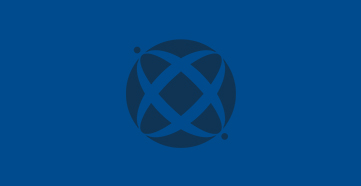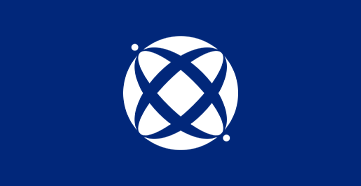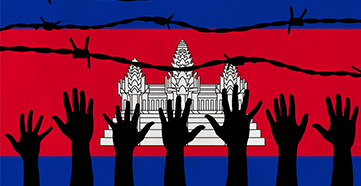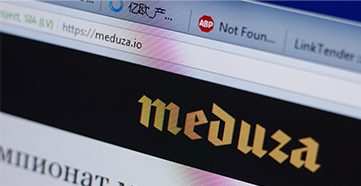|
|
The Italian Communications Authority (AGCOM) has initiated proceedings for online copyright infringement on the application of publishing industry rights holders. The applicants claimed that public channels on the instant messaging platform illegally made thousands of journalistic and literary works from their catalogues available for downloading. AGCOM’s moral persuasion proved pertinent, as Telegram spontaneously removed them. Most recently, emergency legislation has introduced new provisions expanding A
This topic explores the growing legal complexities surrounding the prosecution of owners and issuers of encrypted chat messenger services, with a focus on recent high-profile cases, such a EncroChat and Telegram. It will examine the balance between privacy, security and law enforcement, and discuss the implications of these prosecutions for service providers, users and regulatory frameworks.
27th Annual Transnational Crime Conference
Jun 12, 2024
The new Foreign State Immunity Law 2023 of the People’s Republic of China came into force on 1 January 2024. This shifts the country (as well as its special administrative regions, Hong Kong and Macau) away from absolute state immunity to restrictive state immunity, bringing it more in line with the relatively prevalent practice among the international community. This article discusses the status of state immunity in public international law, analyses the new law’s provisions and examines practical challenges that will be faced by those seeking to utilise this law to enforce judgments or awards against foreign states and state entities, and the new law’s innovations that go beyond the United Nations Convention on Jurisdictional Immunities of States and Their Property of 2004 and the UK State Immunity Act 1978.
Overview of the global landscape of insurance claims, offering analysis on emerging patterns, challenges and best practices in effective claims management across the globe.
IBA Insurance Conference 2024: AI in insurance and other global insights

Sep 27, 2023
The rise in popularity of generative artificial intelligence (‘generative AI’) has ignited the discussion on whether junior employees can be replaced by it. Some have gone to the extent of questioning whether professionals, such as lawyers, can also be replaced by generative AI. Is it wise to replace junior employees or lawyers with generative AI? What factors should be considered before deploying generative AI tools in your business? To consider these questions, we first need to understand the basic workings of generative AI and what it can offer. Fundamentally, AI is intelligence that is not biological. The general understanding is that machines will be ascribed with this intelligence. These machines have the ability to interpret, learn from and process external data in a way that is similar to the capabilities of the human mind. Generative AI is a type of AI program that generates content from a data set. It uses deep learning, a type of machine learning system that behaves like a neural network to simulate the functions of a human brain. In other words, it can mimic human intelligence by exhibiting analytical skills to create new content. Not only can generative AI be utilised in chatbot programs to create text, but it can also be used in programs that can create images, sound or videos. This article will consider two major forms of generative AI, in the context of risks to businesses: chatbots using generative pre-trained transformer technology programs; and image generating programs.
In 2020, the independent advisory body to the Media Freedom Coalition, the High Level Panel of Legal Experts on Media Freedom, published an advisory report ‘A Pressing Concern: Protecting and Promoting Press Freedom by Strengthening Consular Support to Journalists at Risk’ examining the existing State approaches respecting consular assistance for journalists at risk abroad, and proposes a new paradigm of justice and accountability.
Every day, journalists and media personnel around the world fall victim to arbitrary detention, violence or intimidation on account of their work. These attacks resonate beyond their individual cases, being not only attacks on free expression, but also exponential assaults that silence the subjects of the reporting and deprive the public of their stories. By threatening and targeting journalists, States seek to send a dissuasive message, suppressing those who would report on their wrongdoings. According to Reporters Without Borders, as of 2022, over 500 journalists are arbitrarily detained worldwide. This is the highest number of journalists detained in connection with their work that they have ever recorded.
This event, organised by the International Bar Association’s Human Rights Institute who act as Secretariat to the High Level Panel, will feature members of the High Level Panel and guest speakers in conversation on the role of international law in finding concerted approaches to address this mounting issue.
IBA Annual Conference Miami 2022
Cartel-busting, long the mainstay of antitrust enforcement, faces existential challenges in many jurisdictions. Leniency pipelines are no longer producing a steady flow of cases, but are slowing to a trickle, as booming private litigation and the rise of class actions in a number of countries make whistleblowing ever less attractive to cartellists. Electronic communications result in what is at times an overwhelming volume of material to be sifted by all those involved. And artificial intelligence is spawning a wealth of new ways in which markets can be fixed, many of which are hard to detect, and some of which may be beyond the reach of existing laws. As legislators and agencies are reconsidering their amnesty/immunity regimes, the focus in enforcing cartel laws is moving beyond traditional sell-side cartel behaviour into labor and other “purchasing” markets. What is happening to international cartels and globally coordinated enforcement action in the meantime? This session will explore how enforcers, private practice and business around the globe are responding to these and other trends in cartel enforcement.
IBA Annual Conference Miami 2022
Apr 22, 2022
This article discusses the recent SEC case involving PwC and highlights the wider implications for intermediary institutions providing professional services in a tightened regulatory and enforcement regime in China’s banking and financial sector.
IBA Annual Conference Paris 2023
Nov 15, 2021
The Hong Kong Court of Final Appeal clarifies that who is considered a “friend” pursuant to the Prison Rules in respect of visitation rights for inmates awaiting trial and with the presumption of innocence, and whether a friend has to be someone with a personal or intimate relationship with the inmate.
Legislators and regulators have intensified their efforts to drive social media platforms towards ‘good behaviour’ in response to concerns about the harms they cause, as Global Insight reports.
Jun 03, 2021
By Kingshuk Bannerjee. Under the current legal framework in India, arbitrability is the norm and non-arbitrability the exception. The Indian Arbitration Act, which is largely premised on the UNCITRAL Model Law on International Commercial Arbitration 1985, adopts the globally preferred approach of minimal judicial intervention. That said, non-arbitrability is, undoubtedly, a thorn in the side of arbitration.
Dec 23, 2020
The International Bar Association’s Human Rights Institute (IBAHRI) strongly condemns the execution of Ruhollah Zam, an Iranian dissident journalist and editor of the website and Telegram channel AmadNews. Mr Zam was arbitrarily arrested in October 2020 and sentenced to death for ‘spreading corruption on earth’. The sentence was confirmed on 8 December and he was hanged on 12 December 2020.
By Yi-An (Ann) Lai. Alipay and the impact of e-payment systems resulting in new regulations in China and other jurisdictions.
On 1 June 2020, the United States Supreme Court issued its opinion in GE Energy Power Conversion France SAS v. Outokumpu Stainless USA, LLC (GE Energy), holding that non-signatories to an arbitration agreement can compel arbitration of agreements that are subject to the Convention on the Recognition and Enforcement of Foreign Arbitral Awards (New York Convention or simply ‘Convention’) by relying on traditional legal and equitable principles.
This article outlines what to expect in Ukrainian legal market in the course of the next year.
Feb 21, 2019
The International Bar Association’s Human Rights Institute (IBAHRI) is deeply concerned by the continued detention of human rights lawyer, Amirsalar Davoodi, without legal representation. A regular user of social media platforms as well as his Telegram channel, Without Retouch, to speak out about human rights concerns in Iran, Mr Davoodi was arrested in the country on 20 November 2018 and charged with crimes against national security. Access to his lawyer has been denied and family visits left wanting.
Aug 13, 2020
The International Bar Association’s Human Rights Institute (IBAHRI) condemns the detention and use of force against peaceful protesters and journalists in the Republic of Belarus, following the announcement of the initial results of the presidential elections on 9 August 2020. According to the Central Election Commission of Belarus, the elections results indicate that incumbent President Alexander Lukashenko won with 80.23 per cent of votes. Several organisations, including…
Aug 29, 2023
The most recent threat to democratic rule in Cambodia came in the form of July’s national election, which was held against the background of an ongoing media crackdown.
May 24, 2021
The international community breathed a collective sigh of relief on 23 April when opposition leader Alexei Navalny ended a 24-day hunger strike in prison after finally receiving medical care. Yet ongoing efforts to suspend his political organisation and restrict other fundamental freedoms threaten to cripple Russia’s already deteriorating human rights situation.
Apr 04, 2024
The large-scale war waged by Russia on Ukraine has been going on for over two years and has caused enormous damage. The total amount of damage to Ukrainian citizens, businesses and the state itself is yet to be quantified. It already appears to be in the range of hundreds of billions of dollars. It is said that even the total value of all frozen Russian assets in different jurisdictions is far below the value of the damage caused by the Russian aggression against Ukraine.
May 14, 2020
When Roya TV in Jordan aired a report highlighting the concerns of workers over the economic impact of the country’s Covid-19 curfew, the channel was expecting peak viewership as the public stayed home. But, just hours later, two of its top executives were arrested, part of an emerging trend across the Middle East whereby those questioning the official response to the pandemic are penalized and, on occasion, thrown behind bars.
Jun 14, 2022
In March 2014 Russia annexed Crimea and part of the Donetsk and Luhansk region in eastern Ukraine. Fighting has continued in this part of Ukraine since then. From the first days of the invasion, Russia declared the northwestern area of the Black Sea and Sea of Azov a zone of hostilities.
The international community breathed a collective sigh of relief on 23 April when opposition leader Alexei Navalny ended a 24-day hunger strike in prison after finally receiving medical care. Yet ongoing efforts to suspend his political organisation and restrict other fundamental freedoms threaten to cripple Russia’s already deteriorating human rights situation.
Jun 24, 2021
This article discusses the technology and data related developments which made headlines recently and have the potential of changing the way companies do business in India.
Aug 14, 2023
The article discusses key applications available in England and Wales to obtain disclosure to assist with asset tracing and fraud claims.
Dec 20, 2023
This paper dissects in detail the recently passed Nigeria Arbitration and Mediation Act 2023. Specifically, it analyses and explains provisions introduced into the Act which aligns the Act with global arbitration best practices; and the repeal of old provisions that do not meet the standards of global arbitration best practices, or that can be described as archaic.
IBA Global Insight April/May 2017 - Reporting from Athens and Lesvos, Global Insight met lawyers on the frontline of Europe’s refugee crisis as they attempt to gain access to those in greatest need of legal assistance.
IBA Global Insight December/January 2019. Speaking on the 20th anniversary of the Rome Statute, the Prosecutor of the International Criminal Court reflects on progress to tackle impunity for atrocity crimes. She talks to the IBA’s Director of Content, James Lewis, about her priorities, and how threats and pushback against the Court won’t detract from the drive to create a rules-based global order.
IBA Global Insight December 2015/January 2016 - Fatou Bensouda is the Chief Prosecutor of the International Criminal Court in The Hague. A Gambian prosecutor, she worked as a legal adviser at the International Criminal Tribunal for Rwanda in Tanzania and has a wealth of experience in the international judicial system. In conversation with IBA journalist Ruth Green, she spoke about the Court’s jurisdiction and its fight against impunity, and quashed allegations of African bias.
Mar 12, 2025
In the competitive legal market, law firms invest substantial resources in marketing. However, many firms fail to prioritise the ultimate goal of these investments: converting leads into clients. A necessary key performance indicator (KPI) to measure marketing success is the number of leads generated, as leads represent potential business opportunities. However, while generating leads is crucial, success is ultimately determined by how effectively those leads turn into paying clients. Without conversion, marketing efforts become a sunk cost rather than a growth driver.
|




















